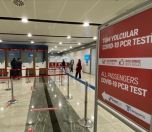* Photo: Omicron variant under a microscope / WHO
Click to read the article in Turkish
The Health Ministry's Coronavirus Scientific Advisory Board convened yesterday (January 12) at 5 pm to discuss the course of the novel coronavirus (COVID-19) pandemic, vaccine program, the results of the domestic vaccine TURKOVAC, test policies, quarantine and isolation rules.
Health Minister Fahrettin Koca has made a statement after the meeting and said that with the omicron variant becoming the dominant variant, they think that the outbreak is now becoming less dangerous.
According to the Minister's statement, "Omicron has become the dominant variant in Turkey, too. The number of cases has increased by nearly 4-fold when compared to the previous month. However, the increase in the rate of inpatients has remained at 10 percent."
"The omicron variant gives the hope that it will make the outbreak less dangerous. The state of affairs reinforces the belief that this hopeful scenario will come true," Fahrettin Koca has stated.
The Minister has also announced that the ones who have received their booster shots will not be quarantined when they are close contacts.
All positive cases may end isolation after 7 days without being tested, according to the statement. The Ministry has also lifted the obligation to have a PCR test for scanning and contact tracing purposes. Only the ones who have the symptoms will have a PCR test conducted.
What does the WHO say?
In a statement earlier today (January 13), World Health Organization (WHO) Director General Tedros Ghebreyesus warned that the omicron coronavirus variant may be less severe than delta, but it remains a dangerous variant, particularly for the unvaccinated people.
WHO Director-General Tedros Ghebreyesus said at a coronavirus webinar that the record number of 15 million COVID-19 cases reported last week were an underestimate, but the death rate remained stable and can be lowered by getting more vaccines to people.
"While the number of patients being hospitalized is increasing in most countries, it is not at the level seen in previous waves," saidGhebreyesus, as reported by the state-run Anadolu Agency (AA).
"The overwhelming majority of people admitted to hospitals around the world are unvaccinated," said the WHO director general, acknowledging that while vaccines remain very effective at preventing severe disease and death, they do not fully prevent transmission.
Ghebreyesus said that the stable death toll was possibly due to the reduced severity of omicron as well as widespread immunity from vaccination or previous infection, adding that the huge spike in infections driven by the omicron variant is rapidly replacing delta in almost all countries.
"But let's be clear: while omicron causes less severe disease than delta, it remains a dangerous virus, particularly for those who are unvaccinated," he said, noting: "Almost 50,000 deaths a week is too many."
Ghebreyesus said that learning to live with coronavirus does not mean the number of deaths is acceptable. "We must not allow this virus a free ride or wave the white flag, especially when so many people around the world remain unvaccinated," added the WHO director general.
In a previous statement about the new variant and the course of the pandemic, Senior Advisor to the WHO Director General Bruce Aylward warned that "omicron will not be the last variant", noting that throwing in the towel in the name of herd immunity will be a greatly wrong choice. (AEK/SD)







